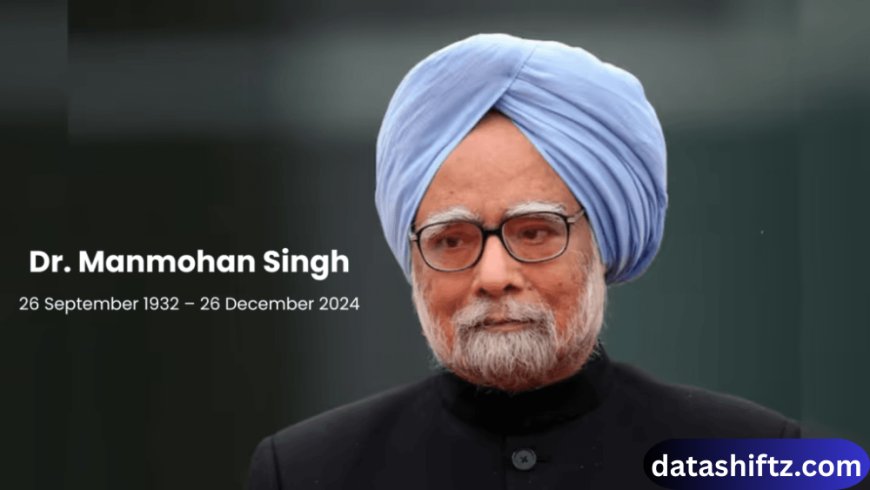Manmohan Singh: The Economist Who Shaped Modern India

Introduction
Dr. Manmohan Singh, the 13th Prime Minister of India, is widely regarded as one of the most influential leaders in the country’s modern economic history. Known for his intellectual acumen, economic foresight, and political integrity, Singh played a pivotal role in liberalizing India’s economy in the 1990s and steering the country through periods of both growth and global challenges.
This article provides a comprehensive overview of Manmohan Singh’s life, career, achievements, policies, and legacy, along with a timeline of major milestones and a list of his key contributions.
Early Life and Education
Childhood and Academic Background
-
Born: September 26, 1932, in Gah, Punjab (now in Pakistan)
-
Early Education: Attended local schools before moving to India post-partition
-
Higher Education:
-
Bachelor’s in Economics from Panjab University
-
Master’s in Economics from the University of Cambridge
-
DPhil in Economics from the University of Oxford
-
Singh’s strong academic foundation in economics laid the groundwork for his future role as a policymaker and reformist leader.
Professional Career Before Politics
Economic Reforms and Advisory Roles
Before entering the political arena, Singh held several key positions in government and international organizations:
| Year | Position | Organization / Role |
|---|---|---|
| 1966 | Officer | Planning Commission of India |
| 1969 | Adviser | International Monetary Fund (IMF) |
| 1971 | Chief Economic Adviser | Government of India |
| 1980 | Governor | Reserve Bank of India |
| 1991 | Finance Minister | Government of India |
-
Authored pivotal economic policies and reports that influenced India’s fiscal and monetary decisions.
-
Introduced structural reforms in banking and trade policies.
-
Advocated for liberalization, privatization, and globalization (LPG reforms).
These experiences equipped Singh with the expertise required to manage India’s complex economic challenges.
Manmohan Singh as Finance Minister
1991 Economic Liberalization
-
India faced a balance of payments crisis in 1991, threatening economic stability.
-
As Finance Minister under Prime Minister P.V. Narasimha Rao, Singh implemented major reforms:
-
Devaluation of Indian Rupee to boost exports
-
Reduction of import tariffs and trade barriers
-
Deregulation of industries to encourage private investment
-
Encouragement of foreign direct investment
-
Impact of Reforms:
-
Accelerated economic growth and foreign investment
-
Modernized the Indian financial sector
-
Laid the foundation for India’s emergence as a global economic player
Prime Ministerial Tenure (2004–2014)
Key Policies and Initiatives
Singh served as India’s Prime Minister for two consecutive terms, focusing on both economic and social reforms.
| Area | Policy / Initiative | Outcome |
|---|---|---|
| Economy | National Rural Employment Guarantee Act (NREGA) | Social security and employment for rural citizens |
| Health | National Rural Health Mission (NRHM) | Improved healthcare access in rural areas |
| Education | Right to Education Act | Free and compulsory education for children |
| Infrastructure | Public-Private Partnerships (PPP) | Boosted infrastructure development |
| International Relations | India-US Nuclear Deal | Strengthened diplomatic and strategic ties |
Achievements
-
India achieved an average GDP growth of 7–8% during his tenure.
-
Successfully negotiated key international agreements, boosting India’s global standing.
-
Maintained a reputation for ethical leadership, despite political pressures.
Challenges and Criticism
Governance and Controversies
-
Singh faced challenges due to coalition politics and party dynamics.
-
His government was criticized for delays in decision-making and corruption scandals, though Singh himself maintained a clean personal record.
-
Global economic slowdown in 2008 affected growth and required policy recalibration.
Despite challenges, Singh’s pragmatic leadership helped India navigate complex domestic and international issues.
Legacy and Impact
Long-Term Influence
-
Economic Reforms: Widely recognized as the architect of modern India’s economic liberalization.
-
Policy-Making Excellence: Known for evidence-based and technically sound policy decisions.
-
Global Recognition: Featured in Forbes and other global rankings for his leadership and integrity.
-
Mentorship: Inspired a generation of economists, bureaucrats, and policymakers.
-
Clean Leadership: Maintained a reputation for honesty and moral integrity in politics.
Key Contributions in List Form
-
1991 Economic Liberalization: Opened India to global markets
-
Prudent Fiscal Management: Strengthened financial institutions and banking reforms
-
Social Welfare Initiatives: NREGA, NRHM, Right to Education Act
-
Infrastructure Development: Promoted PPP models in roads, ports, and energy
-
Foreign Policy Milestones: India-US Civil Nuclear Agreement, improved international ties
Timeline of Major Milestones
| Year | Milestone |
|---|---|
| 1932 | Born in Gah, Punjab (now Pakistan) |
| 1966 | Joined Planning Commission |
| 1971 | Appointed Chief Economic Adviser |
| 1980 | Became RBI Governor |
| 1991 | Finance Minister, spearheaded economic liberalization |
| 2004 | Became 13th Prime Minister of India |
| 2008 | India navigates global financial crisis under his leadership |
| 2014 | Completed two terms as Prime Minister |
| 2025 | Continues to influence economic and political discourse |
Personal Life
Family and Interests
-
Married to Gursharan Kaur, a poet and social worker
-
Has three daughters, all professionally established
-
Known for his modest lifestyle, reading habits, and passion for history and economics
Singh’s personal values of simplicity and integrity have often been highlighted as integral to his public persona.
Conclusion
Dr. Manmohan Singh stands as a symbol of intellectual rigor, ethical governance, and transformative leadership. From orchestrating India’s economic liberalization to serving as Prime Minister during a period of significant global and domestic challenges, Singh’s legacy continues to influence India’s economic and political landscape.
In summary:
-
A visionary economist and policymaker
-
Implemented reforms that shaped modern India’s economy
-
Promoted social welfare and inclusive growth
-
Maintained a reputation for honesty, integrity, and calm leadership
Manmohan Singh’s life and career exemplify the impact of principled leadership and thoughtful governance, making him one of the most respected figures in India’s history.





























